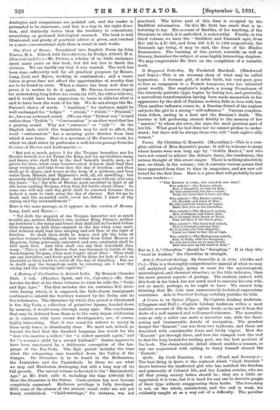The Iliad of Homer. Translated into English Prose by John
Purves, M.A. Edited, with Introduction, by Evelyn Abbott, M.A. (Percival and Co.)—Mr. Pnrves, a scholar of no little eminence, spent many years on this book, but did not live to finish the revision. We can hardly say that it was wanted. The work has been done sufficiently well for all practical purposes by Messrs. Lang, Leaf, and Myers, working in combination ; and a trans- lation in prose dees not afford the opportunities of novelty that are to be found in verse. When a classic has been well done in prose, it is useless to do it again. Mr. Purves, however, began his undertaking long before his rivals (in 1871, the editor tells us), and it would have been ungracious to leave in oblivion what is said to have been the work of his life. We do not always like Mr. Purves's choice of words. " Auxiliary," for instance, might be well exchanged for " helper." " Atride," " Pelide," "Priamid," &c., have an awkward sound. (We see that " Tydeus' son " is used rather than "Tydide.") " Conversation" is another word that has a grating sound. Why not " converse," or " talk " ? In the English style which this translation may be said to affect, the word " conversation " has a meaning quite distinct from that which it now bears. Here is a specimen of Mr. Purves's work, for which we shall select by preference a well-known passage from the 0.zristus of Hector and Andromache :—
" But not so much grieve I for the Trojans hereafter, nor for Hecabe herself, nor for Priam the King, nor for my brothers many and brave, who shall fall in the dust beneath hostile men, as I grieve for thee, when some brazen-coated Achtean shall lead thee away weeping, and take from thee the day of freedom : and thou shalt go to Argos, and weave at the loom of a mistress, and bear water from Messeis and Hypereia's well, all, all unwilling; but necessity shall be laid upon thee. And some man will say, who sees thy tears : Lo ! the wife of Hector, most excellent in fight of all the horse-curbing Trojans, when they did battle about Ilium.' So some one will say, and thy grief shall be renewed because thou lackest a man to turn away the day of slavery. But let me be dead, and the mounded earth cover me, before I know of thy crying and thy mishandlement."
Here is the same passage, as it appears in the version of Messrs. Lang, Leaf, and Myers :— " Yet cloth the anguish of the Trojans hereafter not so much trouble me, neither Hekabe's own, neither King Priam's, neither my brethren's, the many and brave that shall fall in the dust before their foemen, as doth thine anguish in the day when some mail- clad Achaian shall lead thee weeping and rob thee of the light of freedom. So shalt thou abide in Argos, and ply the loom at another woman's bidding, and bear water from fount Messeis or Hypereia, being grievously entreated, and sore constraint shall be laid upon thee. And then shall one say that beholdeth thee weep : ' This is wife of Hector that was foremost in battle of the horse-taming Trojans, when men fought about Ilios.' Thus shall one say hereafter, and fresh grief will be thine for lack of such an husband as thou hadst to ward off the day of thraldom. But me in death may the heaped-up earth be covering, ere I hear thy crying and thy carrying into captivity."


































 Previous page
Previous page